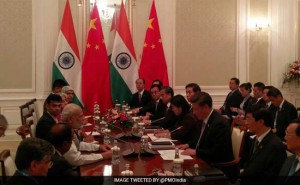NSG :China leads opposition to India’s membership bid , PM Asks For Support
 NEW DELHI: Even as Prime Minister Narendra Modi today urged Chinese President Xi Jinping to make a ‘fair and objective’ assessment of his country’s entry to the 48-nation grouping, media reports said on Thursday that no consensus had emerged in the Nuclear Suppliers Group (NSG) meet about India’s induction in the nuke club.
NEW DELHI: Even as Prime Minister Narendra Modi today urged Chinese President Xi Jinping to make a ‘fair and objective’ assessment of his country’s entry to the 48-nation grouping, media reports said on Thursday that no consensus had emerged in the Nuclear Suppliers Group (NSG) meet about India’s induction in the nuke club.
China is said to have ‘belligerently’ led opposition to India’s membership of NSG at a three-hour post-dinner meeting of the Nuclear Suppliers Group here tonight which ended in a deadlock.
Preceding the two-day plenary of the 48-member NSG, which began today, China had repeatedly said that India’s membership was not on the agenda and is said to have made every effort to prevent any discussion on India’s bid.
However, Japan is believed to have raised India’s case in the morning session after which it was agreed that the matter would be taken up at the special post-dinner meeting.
Indian official sources said that China was joined by countries like Turkey, Austria, New Zealand, Ireland and Brazil, which questioned as to how a country like India which had not signed the Nuclear non-Proliferation Treaty (NPT) can be admitted to the grouping.
Brazil’s objections are said to have surprised the Indian diplomats who pointed out that it is a member of the five-nation BRICS grouping. Besides India and Russia, the grouping includes Russia, China and South Africa.
About 300 participants from 48 member countries are attending the plenary. Officials said that discussions were inconclusive and that it would only be clear before the end of the plenary tomorrow.
Earlier today, meeting on the sidelines of the Shanghai Cooperation Organisation (SCO) Summit, PM Modi told Jinping that India’s case should be judged on its own merits and China should contribute to an emerging consensus in the Seoul meeting, according to External Affairs Ministry Spokesperson Vikas Swarup.
However, when asked about China’s response, Swarup refused to comment, saying, “You know, it is a complex and delicate process. We are waiting (to see) what kind of news comes from Seoul. I will not make any more comment on this.”
Swarup also stated that most of the time of the Modi-Xi meeting was devoted to the NSG issue.A marathon three-hour post-dinner meeting of the Nuclear Suppliers Group (NSG) in Seoul on Thursday ended in a deadlock over India’s membership. The meeting will resume on Friday.
According to Top government sources the China remains the main opponent but Brazil, Austria and Ireland also raised questions on how a non-NPT (Non-Proliferation Treaty) signatory can be admitted to the NSG, which controls access to nuclear technology.
Officials describe these as questions raised over “processes” but said China’s opposition was belligerent. “It seems to have ended up as a broad inconclusive discussion. No clear cut conclusions can be reached at this stage,” sources said.
China, say sources, spent the day trying to prevent the NSG from even discussing India’s membership at all. Brazil’s objections will come as a setback to India since it is a key ally. Foreign Secretary S Jaishankar, who is in Seoul, met the Brazilian delegation earlier in the day.
Prime Minister Narendra Modi, in a 45-minute meeting with Chinese President Xi Jinping on the sidelines of a multilateral summit in Tashkent, requested a “fair and objective assessment” of India’s bid
PM Modi said New Delhi’s case should be judged on its own merits and that China should contribute to an emerging consensus in Seoul. About 300 participants from 48 member countries are attending the meeting in Seoul.
China has been unrelenting in its opposition, harping on the need to have a criteria for non-NPT countries like India and clubbing India’s case with that of Pakistan for which it is batting.
India wants to become a member of the NSG to get better access to low-cost, clean nuclear energy crucial to its economic growth.
The NSG works on unanimity and even one opposing vote can mean the rejection of India’s membership.

